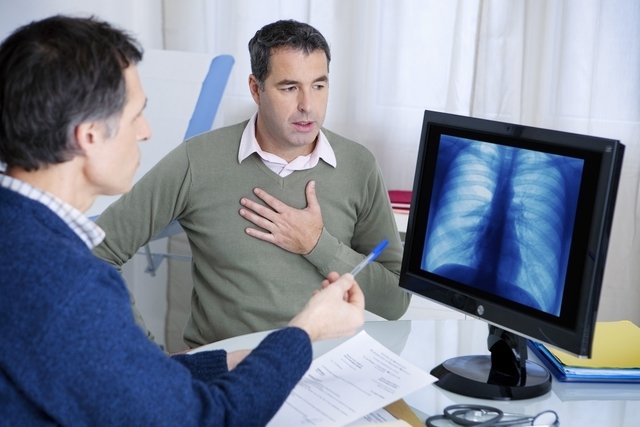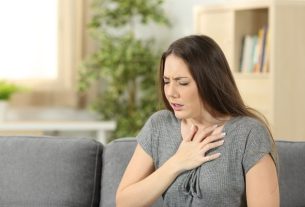Wheezing is usually a sign of asthma or chronic obstructive pulmonary disease (COPD). This happens because in this type of condition there is a narrowing or inflammation of the airways, which ends up making the passage of air difficult and causes the appearance of a characteristic sound, known as wheezing.
However, wheezing can also be indicative of a heart problem, as poor heart function can facilitate the accumulation of fluid in the lungs, making it difficult for air to pass through the airways.
Therefore, since wheezing is almost always related to some type of health problem, it is recommended to consult a general practitioner to try to understand the cause, be referred to the best specialist and start the most appropriate treatment.

Main causes
The main causes of wheezing are:
1. Asma
Asthma is a chronic inflammatory disease of the airways, which causes difficulty breathing, especially after the person is exposed to some type of allergen, such as animal dander or dust, for example. This is one of the main causes of wheezing when breathing and can be associated with other symptoms such as shortness of breath, tiredness and chest tightness.
What to do: Asthma has no cure, but it can be treated with the use of some medications, such as corticosteroids or bronchodilators. Treatment depends on the person’s health history and, therefore, should always be guided by a pulmonologist. See more about asthma treatment options.
2. COPD
Chronic Obstructive Pulmonary Disease, also known as COPD, is a disease that encompasses chronic bronchitis and pulmonary emphysema, which are, in addition to asthma, other of the most common causes of wheezing.
In addition to wheezing, other characteristic symptoms of COPD are the feeling of shortness of breath, coughing and difficulty breathing. Understand better what COPD is and see how the diagnosis is made.
What to do: The treatment of COPD consists of adopting a healthy lifestyle, avoiding the use of cigarettes, for example, in addition to undergoing treatment guided by a pulmonologist, which generally consists of the use of corticosteroids and bronchodilators.
3. Respiratory infections
Respiratory infections such as bronchitis, bronchiolitis or pneumonia can also be a cause of wheezing, as they are diseases that make breathing difficult, causing shortness of breath and the production of phlegm. See how to identify a respiratory infection and how to treat it.
What to do: The treatment of respiratory infections is carried out with antibiotics, if it is an infection caused by bacteria, and in some cases it is necessary to administer corticosteroids and bronchodilators, to reduce inflammation and facilitate breathing.
Rest, hydration and eating a balanced diet are also measures that accelerate healing.
4. Exposure to cigarette smoke
Exposure to cigarette smoke is a risk factor for developing respiratory diseases, such as pulmonary emphysema or chronic bronchitis or for worsening asthma, which ends up contributing to inflammation of the airways and the appearance of wheezing.
What to do: To avoid developing a lung disease or worsening an existing disease, you must stop smoking. See 8 tips for stopping smoking.
5. Inhaling an object
Inhaling an object or foreign body, such as a small toy, for example, generally occurs in children and can be a very dangerous situation, as it can cause obstruction of the airways.
The first symptoms that may appear are difficulty breathing, coughing and wheezing, which will depend on the region where the object was stuck.
What to do: In case of suspected inhalation of an object, it is recommended to immediately go to a medical emergency room.
6. Heart problems
The existence of a heart problem, such as heart failure, is also one of the most common causes of wheezing, especially in older patients. This happens because, since the heart is not pumping blood correctly, fluid can accumulate in the lungs, which makes the tissues more swollen and makes it harder for air to pass through, causing wheezing.
Other common symptoms in people who have some type of heart problem are excessive tiredness during the day, swelling of the legs, difficulty breathing and a persistent dry cough, for example. Check out 11 signs that could be a sign of heart problems.
What to do: Whenever there is a suspicion of some type of heart problem, it is very important to consult a cardiologist to identify the cause and initiate the most appropriate treatment.
7. Sleep apnea
Sleep apnea is the main cause of wheezing when sleeping, which can also progress to snoring. This condition causes a momentary stoppage of breathing or breathing difficulties during sleep, due to a change in the muscles of the larynx that causes the airways to become obstructed.
In addition to the sounds produced during sleep, sleep apnea can also cause a person to wake up tired, as if they had been exercising while sleeping.
What to do: The treatment of sleep apnea can be done through the use of a specific device, called CPAP, or surgery, when the use of the device is not sufficient. Learn more about treating sleep apnea.
8. Gastroesophageal reflux
Gastroesophageal reflux consists of the return of stomach contents to the esophagus and mouth, which can damage the upper airways due to the acidity of gastric juice. Although the most common symptoms are heartburn, poor digestion and a burning sensation in the esophagus and mouth, the constant contact of acid with the respiratory tract can also cause hoarseness, coughing and wheezing.
What to do: The treatment of gastroesophageal reflux is done through changes in eating habits and with medicines that protect and reduce stomach acidity. See which remedies are most used to treat reflux.

Sign up for our newsletter and stay up to date with exclusive news
that can transform your routine!
Warning: Undefined array key "title" in /home/storelat/public_html/wp-content/plugins/link-whisper-premium/templates/frontend/related-posts.php on line 12
Warning: Undefined array key "title_tag" in /home/storelat/public_html/wp-content/plugins/link-whisper-premium/templates/frontend/related-posts.php on line 13




